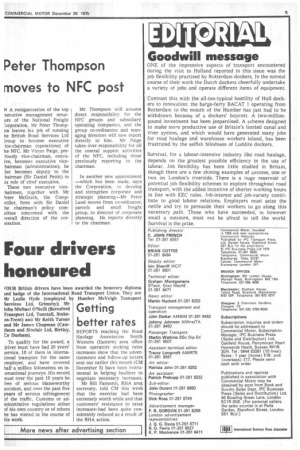Goodwill message
Page 7

If you've noticed an error in this article please click here to report it so we can fix it.
ONE of the impressive aspects of transport encountered during the visit to Holland reported in this issue was the job flexibility practised by Rotterdam dockers. In the normal course of their work the Dutch dockers cheerfully undertake a variety of jobs and operate different items of equipment.
Contrast this with the all-too-typical hostility of Hull dockers to innovation: the barge-ferry BACAT 1 operating from Rotterdam to the mouth of the Humber has just had to be withdrawn because of a dockers' boycott. A two-millionpound investment has been jeopardised. A scheme designed to make more productive use of Britain's limited canal and river system, and which would have generated many jobs for road haulage and warehouse workers inland, has been frustrated by the selfish blindness of Luddite dockers.
Survival, for a labour-intensive industry like road haulage, depends on the greatest possible efficiency in the use of labour, Job flexibility has been little studied in Britain, though there are a few shining examples of success, one or two on London's riverside. There is a huge reservoir of potential job flexibility schemes to explore throughout road transport, with the added incentive of shorter working hours in line with EEC rules. Job-interest and job-variety contribute to good labour relations. Employers must seize the nettle and try to persuade their workers to go along this necessary path. Those who have succeeded, in however small a measure, must not be afraid to tell the world. Survival is the prize.




















































